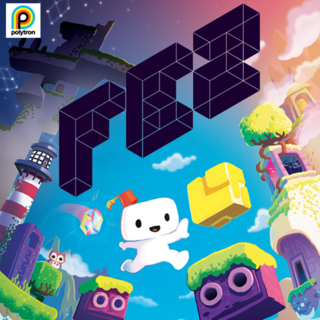Fez plays like a love letter to classic Japanese games from long ago.
Cons: Some puzzles are irritatingly cryptic; Controls don't feel tight
It's a shame that a lot of people have chosen to pass on Fez because of Phil Fish's comment about how modern Japanese games suck. It's partially a shame, because he's actually a little bit right (forgetting Nintendo, Platinum Games, and FromSoftware, most Japanese studios have fallen a bit behind as of late). It's partially a shame because Fez is a great game. And ironically, it's a shame because Fez feels like a lost Japanese game of the yesteryear in the best way possible.
Boot up Fez and it instantly shows off its love for old-school games. Everything from the colorful vector menus to the gorgeously detailed, blocky landscapes just reeks of old-school love. Step into the village and its NPCs have goofy lines and references to other games that are easily missed. If you open a treasure chest, the camera swings around like in Zelda, and when you get a cube, Gomez (the main character) jumps into the air, like Mario does in his 3D games. It's clear that Phil Fish actually loves a lot of old Japanese games from all the little touches and charms in Fez.
The design is a bit more modern, but not by much. Although Fez is a 2D platformer, you get to rotate the world to create new illusions (ex: ladders that don't line up from one perspective, appear to connect perfectly from another angle)-think echochrome or Super Paper Mario. If you decide to go for 100%, you can check the game's map to discover which areas you've completed, and which ones still have secrets. And there's virtually no death penalty.
The above is a summary of every modern design feature in the game. Beyond that, everything is as old-school as it gets. Once you get past the initial area (where the controls are displayed for you), you are told virtually nothing. All you know is that you need to collect a bunch of cubes for something (though it's never clear what). Puzzles both take the form of neat platforming challenges involving that rotating perspective, and old-school pattern recognition.
At several points in the game you are bound to encounter some codes written on a wall. These might suggest a code to enter, which doors to take, a direction to go, or anything really. This is the one spot where the old-school design gets a little rough. I'm all for cool secrets and that awesome feeling you get for being rewarded for reading a little too much into something. However, these puzzles are often a bit too obtuse, and thus frustrating. Now, you never have to solve all of these puzzles to succeed, but it can be frustrating to come upon a dead end, knowing that you'll either hit your head repeatedly against a wall or look elsewhere for the answer. These puzzles worked in the old days partially because nobody knew better and because the internet wasn't as widespread. Thus, cool secrets were spread by word of mouth, and community was reinforced among you and your friends. However, with the internet to make research easy, and with so many games that your friends likely don't have Fez, the appeal of these puzzles is a little lost.
However, everywhere else, the old school design feels expertly woven into the experience. Independent thought and discovery are highly rewarded, and the game has an inescapable, optimistic charm that you just don't see in modern AAA games. Obviously some are going to be frustrated by the obtuse puzzles, and others hate Phil Fish for his outspoken comments. But in the end, Fez is a blast for everyone else, and a smart fusion of old-school design with a few modern corrections. It simultaneously feels like it could have been developed by a Japanese studio 20 years ago, and keeps enough modern sensibilities to rarely get frustrating. Fez is a great little hybrid that you should definitely play.

